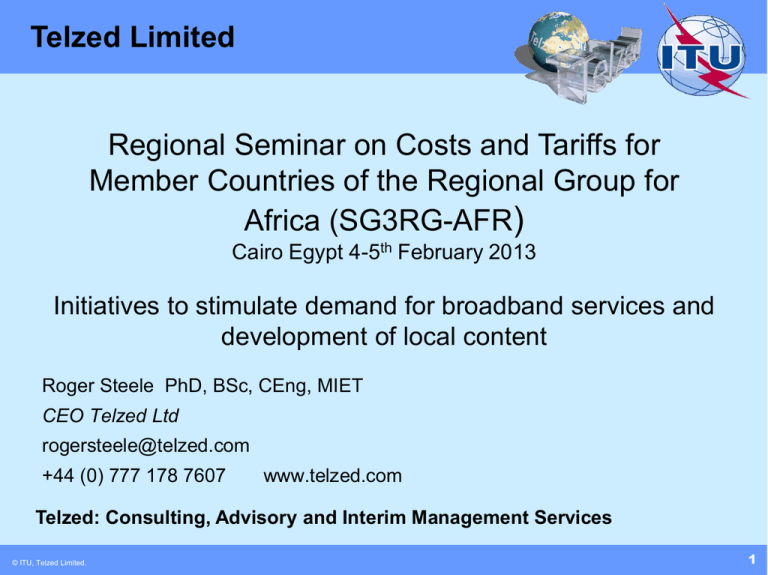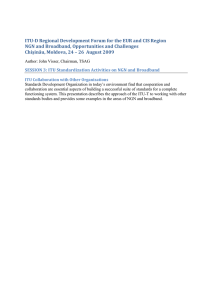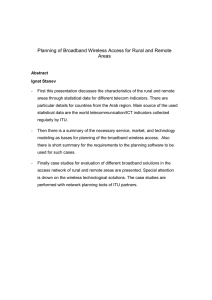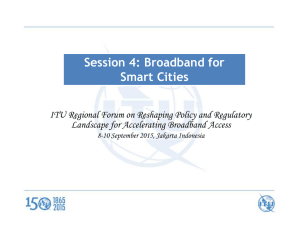) Telzed Limited Regional Seminar on Costs and Tariffs for
advertisement

Telzed Limited Regional Seminar on Costs and Tariffs for Member Countries of the Regional Group for Africa (SG3RG-AFR) Cairo Egypt 4-5th February 2013 Initiatives to stimulate demand for broadband services and development of local content Roger Steele PhD, BSc, CEng, MIET CEO Telzed Ltd rogersteele@telzed.com +44 (0) 777 178 7607 www.telzed.com Telzed: Consulting, Advisory and Interim Management Services © ITU, Telzed Telzed Limited. Limited. 1 Context This presentation is a follow on from Session 1 where the strategic issues were considered In this session we look at practical measures to develop NGNs and how to increase the local content and demand that provide the economic benefits This session considers some of the “how” and “what” to do issues to meet the policy aims discussed in the earlier session This paper is a discussion/ideas document. Any ideas expressed need not represent views of Telzed Limited or any client. No liability is accepted for any actions taken based on the report. No warranty is given for the accuracy of any information. © ITU, Telzed Telzed Limited. Limited 2 Agenda Funding Costs reduction and demand for a virtuous circle Some technical issues A little broadband is better than none Addressing the key parts of the value chain © ITU, Telzed Telzed Limited. Limited 3 Next generation networks – a reminder of the key structures Voice, data, TV etc. service platforms 4G/LTE wireless access Local loop access interconnection Copper final links Fibre Cabinet Fibre access Shared packetbased core Other service providers Network interconnection Internet Copper access 2G and 3G voice and data © ITU, Telzed Telzed Limited. Limited Internet based services 4 Funding of NGN is always going to be a problem Government Local government Commercial (private business) International aid/grants/loans Public-private funding) Communities and cooperative approaches Ideally free market and commercial business do everything Most countries have some aspects of government funding All methods have a role Getting the optimum mix of approaches and where to target the funding are the key initiatives that all countries have to address Less money available, increases the sensitivity © ITU, Telzed Telzed Limited. Limited 5 There are inevitable conflicts between the options All free market = no tension But probably not enough investment Any government or external funding can create conflicts with the free market and other investment decisions Danger: objections to government-help can stop any NGN/broadband What is suitable in one region may not work in another: city versus rural. But action in one region can impact another Central/external funding may make services affordable in one area, but this price expectation cannot be matched in another There is always (?) going to be a digital divide Getting some broadband is surely better than everyone getting nothing © ITU, Telzed Telzed Limited. Limited Government Local government Commercial (private business) International aid/grants/loans Public-private funding) Communities and cooperative approaches 6 Target the initiatives TV, video and radio Applications and content International links and transit Service and IT hosting ISP Network service (voice, data etc.) Core network infrastructure Spectrum Access cables Access duct © ITU, Telzed Telzed Limited. Limited The whole value chain is relevant Finding and policy initiatives need to be focussed 7 Local initiatives Communities can act together Cooperatives, or local businesses can emerge address local needs Must not allow the telcos to move in and undermine their local investments Use innovative approaches: wireless, microwave, wifi, optical line of site, satellites, copper, fibre etc Many techniques have been used. “Mix and match” to fit the situation Need backhaul services up to the ISP/Internet. This in contrast to the (more common) regulated access down to the customer for ISP/altnet © ITU, Telzed Telzed Limited. Limited 8 Example initiatives at the bottom (underground!) Digging is expensive Shared digs Force ducts to be installed Share infrastructure – trenches, pipes, cables and civil works Relevant for access an inter-city Build a new road, housing, railway, water etc. – the additional effort and cost to add in NGN provisions is small One cable in a community is far better than none © ITU, Telzed Telzed Limited. Limited Why am I only putting power cables in this trench? 9 Get “radical” with the local loop thinking Telcos are based on copper local loops of ~5km maximum. This led to many local exchanges (or remote concentrators). Only in city areas were sites driven by the maximum numbers of customers possible into one switch (even more sites) • Result: a legacy of a lot of sites, and legacy mentality • But emerging economies often have limited past networks, so: can by-pass the migration problems encountered elsewhere Get rid of the local sites Few limitations on numbers of customers served by a single service platform Long distance fibre and “simple” transmission to a very few central sites As many as possible Integrate mobile/wireless Fibre Cabinet As few as possible As far as possible As few as possible (centralised) Lower costs! © ITU, Telzed Telzed Limited. Limited 10 Example initiatives further up the chain Share mobiles infrastructure Do not use mobile as a simple source of tax/revenue: at least be sensible with any actions Mobile is now for everyone, not just the rich! In many countries the fixed players never met the consumer’s needs Allow masts and infrastructure to be shared and community access to infrastructure Consider an underlying mobile network provider and allow MVNO service provision – sharing of networks Allows competition at the service level Allow/encourage backbone providers © ITU, Telzed Telzed Limited. Limited Tax revenues rise from general economy improvements. Do not tax telecom/broadband/services without good reason 11 International capacity and local content International capacity and IP transit is expensive in emerging/remote economies Most Internet content is initially overseas – increases the cost to each customer More local content reduces the international cost-contribution. Huge benefits to end users from local language content More international volumes reduce the per-unit costs As demand increased Content Data Networks emerge – service providers move their servers to be closer to the customers. This reduces the dependency on (and cost of) the international portion of the total service cost © ITU, Telzed Telzed Limited. Limited 12 International capacity and local content Reduces perunit cost of International capacity costs Reduced need for The user experience and benefits are greater if local language is used This reduced need to international capacity Local content increases demand Increasing demand reduces the international capacity cost More demand moves overseas applications, content, servers from overseas. Content delivery networks More demand reduces prices that increases demand for content and services and so on © ITU, Telzed Telzed Limited. Limited Demand – total usage Local content Stimulates 13 Increasing demand and local content IT support and secure sites & systems TV, radio, education, healthcare and government services Minimise costs with possible reducedcompetition risks Move services to be available on Internet The sooner the move, then the greater the demand and the lower the cost, and the greater the demand Emerging economies might need to balance/sacrifice some aspects to get the demand up as fast as possible (see also earlier session paper) This suggests possibly more funding assistance and intervention at the higher levels of the value chain than typically seen in more developed economies © ITU, Telzed Telzed Limited. Limited 14 Education All types of education can be provided over broadband Major stimulus for broadband and clear benefits for remote access to specialists and skills Less commonly considered is education on: How to develop service and content (IT) How to install and build NGN/NGA Increasing NGN technical skills is an enabler that has wide ranging benefits © ITU, Telzed Telzed Limited. Limited 15 Resale and sharing I saw on the village video that the market does not have these goods on sale Retail re-sale should be allowed Creates some “after market” competition Enables one user to share broadband with neighbours Multi-tenanted buildings need ways to share a single access point Allows broadband shops and Internet cafes Sharing is vital with low PC penetration in low GDP countries Allow systems and payments to be shared. Micropayments and transfer of mobile usage credits have already benefited many countries © ITU, Telzed Telzed Limited. Limited I hate going home from the market while still having a full load 16 Some is better than none, then others will follow Broadband is not wanted by everyone Not everyone can afford it But there are often a few who can afford it (or can group together to pay for it) Once the neighbours have something new/fun/better, then others want it See: mobile phones, iPhone, tablets and TVs Attitudes to what is needed and is thought to be vital, change This stimulates demand – and this kicks off further price reductions as more broadband is delivered Broadband is then less unaffordable Do not hold back just because everyone cannot afford it © ITU, Telzed Telzed Limited. Limited Politics & social engineering have a role to play 17 “Mix and match” technologies to meet and stimulate demand Mobile/wireless is likely to be more important in developing economies than more advanced countries Speed Lack of existing fixed networks. Mobile is already dominant. See cost speed/cost difference Copperfibre Wireless – high density Fibre to the premises Wireless – low density Wireless – very high density Wireless needs backhaul – can integrate with FTTX Any existing copper – can link into to FTTC migrations Smart phones and tablets – mostly work over mobile or wireless. Cool/desirable. Many customers will not be able to afford more than one device. Broadband allows “offloading” of traffic on to fixed (fibrebased) networks Copper upgrade New copper build Cost per subscriber Need to think laterally and innovate solutions to fit the locality © ITU, Telzed Telzed Limited. Limited 18 Summary of some key messages There are synergies of more usage, benefits and lower costs. Getting the growth up to a level that starts to trigger the spiral of benefits is a key requirement Need focused intervention. The areas to assist with will vary by country and are typically different in emerging economies that developed ones. Few countries can afford to serve everyone Local initiatives should be allowed – one solution for everyone might not be possible. Something for some is better than nothing for all Be careful of taxes. Telecoms enables other business, so be careful/sensible! Education benefits over broadband are well known. Education on how to use IT is needed. Place stronger emphasis on NGN build and installation skills, not just IT development and services supply/build Some simple planning rules on digging, duct, infrastructure sharing with utilities will help reduce costs © ITU, Telzed Telzed Limited. Limited 19 Questions and enquiries always welcome Roger Steele +44 (0) 777 178 7607 www.telzed.com © ITU, Telzed Telzed Limited. Limited 20 © Telzed Limited. 21


